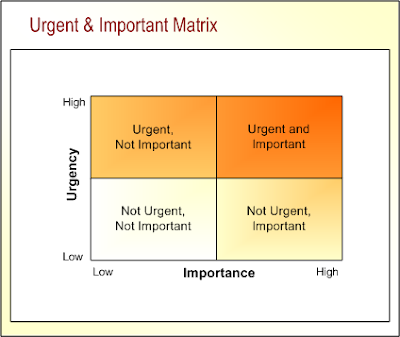I’ve asked this question to hundreds of people in numerous organisations in the UK and the rest of Western World and have never always heard a resounding “No!” Most of us are living in the experience of having too much to do and not enough time to do it in. We are “time poor” to steal a phrase.
I have streamlined my life in the past few years as my commitments have grown exponentially, first working in the non-profit sector and then starting my own business. This year things got to a head as I reached the limits of what fat I could trim and what system I could make up myself to keep on top of things. By this point most people who knew me would regard me as very organised and my Blackberry had become a source of humour for my older friends. I narrowly avoided burn-out, had to look for expert help. These days I teach basic time-management in my stress management workshops as having “to much to do” and the consequences of this is by far the biggest stressor I come across and the consequence of this are pretty serious – people hating their jobs, hating each other and dying from ill health. I also lead bespoke time management training courses specialising in this area.
In a way the state of affairs is a symptom of the “time poor” zeitgeist we live in, and a part of
the wider condition of affluenza. It is my contention that the current economic readjustment will alleviate some symptoms of this disease but not this one. We are infected with the idea that we don’t have “enough” time like there is less now than there was before. Perhaps there are more opportunities now and greater expectations as to what can be done in a life – and that’s what time management is – the art of making the best use of your breaths before they cease.
The coaching course I’m currently doing with Newfield claims that the term time management is a misnomer as it’s not time but commitments that need be managed. Overwhelm comes from not knowing what ALL our commitments are (work and life) and from not being sure if we can manage our promises. This angle is aligned with my favourite time management approach: Getting Things Done from David Allen. Getting Things Done (GTD) is famous for its lists and brutally efficient approach to getting in-boxes empty:
Never put anything back into ‘in’
If an item requires action:
Do it (if it takes less than two minutes), OR
Delegate it, OR
Defer it.
File it for reference, OR
Throw it away, OR
Incubate it for possible action later.
More
I’ve been working with Getting Things Done (GTD) for a couple of months now and really like the results. Aside from making me more efficient (I estimate I get around 50% more done now) the main thing I like about it is that it’s got much of the junk and chatter out of my mind. I now have reliable systems in place to “capture” ideas and things I would like to do so I don’t have to be constantly thinking about them. Future Considerations are in the process of bringing GTD to the UK. Recommended.
 Incidentally GTD also has a martial arts connection and is sometimes called “The martial art of work and life.” David uses karate metaphors such as suggesting we develop a “mind like water.” For me time management shows how there is no contradiction between being relaxed and being super efficient to get the most done. I’d disagree with some old friends who say I’ve gotten up-tight, I’d say I was making an art form of getting relaxed – relaxed like a puma not a drunk mind you.
Incidentally GTD also has a martial arts connection and is sometimes called “The martial art of work and life.” David uses karate metaphors such as suggesting we develop a “mind like water.” For me time management shows how there is no contradiction between being relaxed and being super efficient to get the most done. I’d disagree with some old friends who say I’ve gotten up-tight, I’d say I was making an art form of getting relaxed – relaxed like a puma not a drunk mind you.
Older approaches to time management than GTD tend to focus on priorities. I have found the distinction between urgent and important to be useful for example.

A fun short traditional time management book I suggest people in my stress workshops read is Eat That Frog.
As well as making good use of time, I’d also recommend being there – making time good. By this I don’t mean that every moment can be a climatic pleasurable TV commercial triumph but that you can be aware of your life. They’ll be a post on mindfulness on this blog soon.
………….
Time Management/ GTD So What: Time is the most precious thing you have – learn how to enjoy it.
